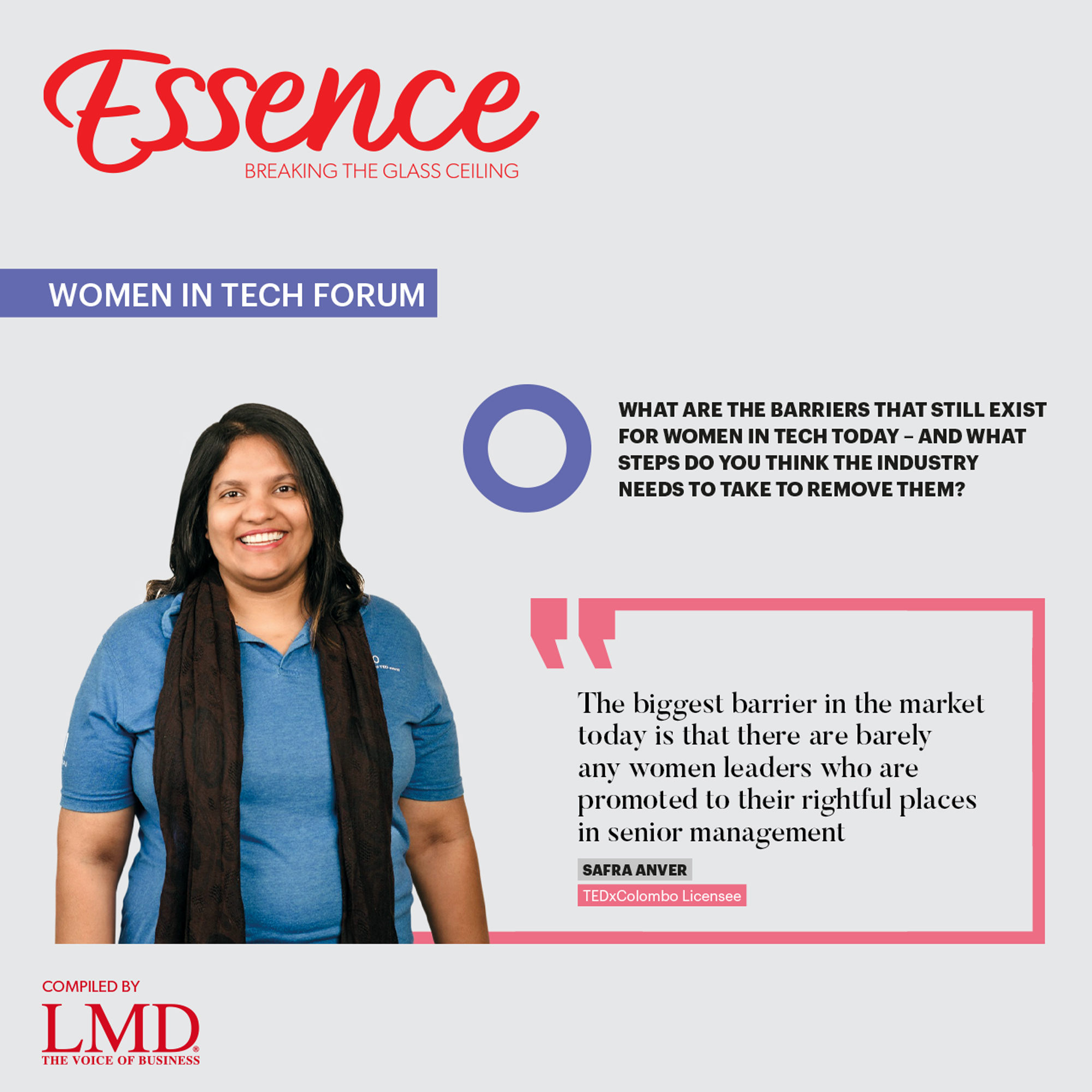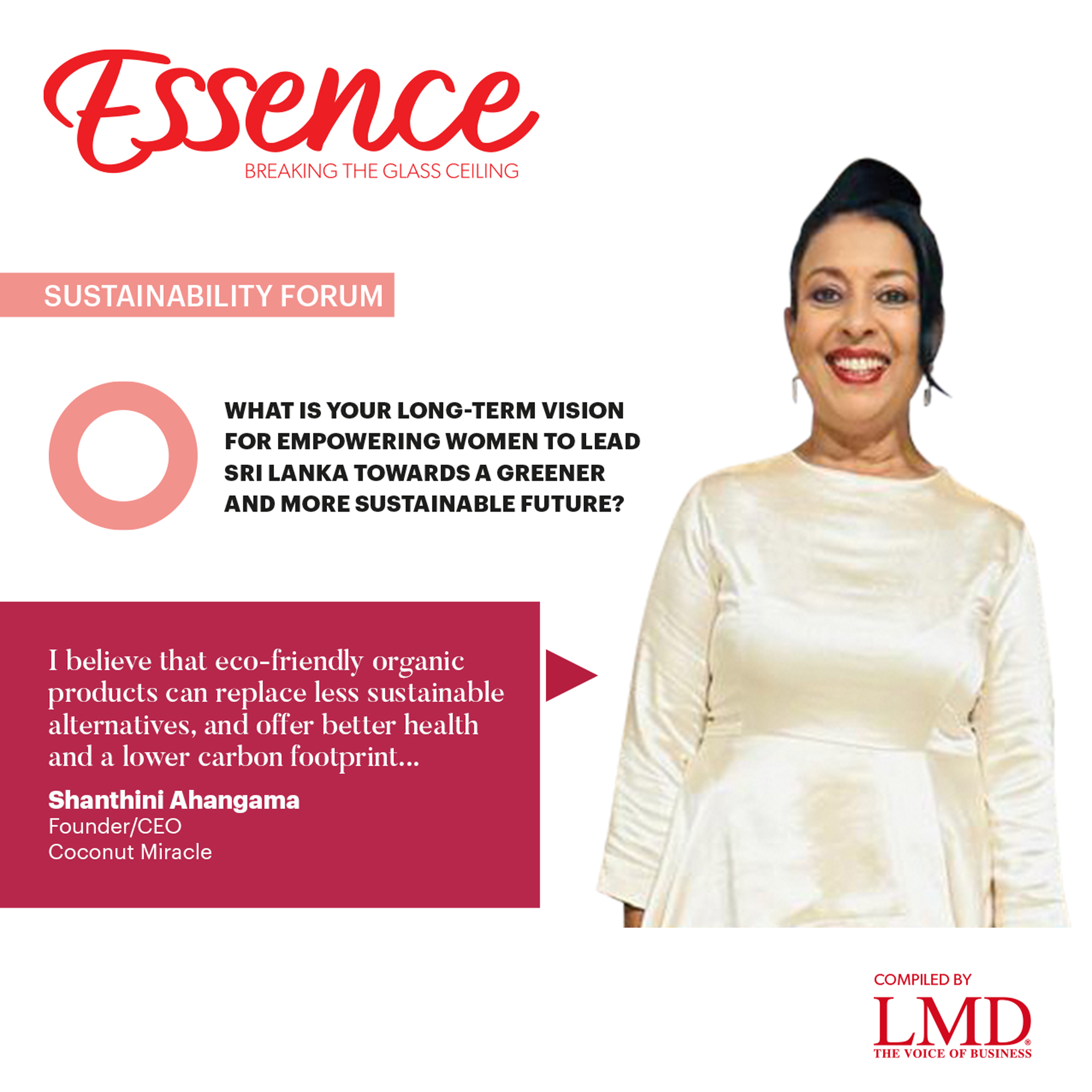ESSENCE PROFILE
First Capital Holdings

Deputy Chairperson
Q: How is Sri Lanka faring in women’s representation in business?
A: It is making some progress, albeit slowly. Though we are seeing high rates of participation of women in higher education, this isn’t translating into participation in the workforce.
The statistics are revealing: female labour force participation is currently a little over 32 percent compared to 75 percent for males, which is a significant gap. Even today, only 11 percent of directors on the Colombo Stock Exchange’s (CSE) listed entities are women.
This situation is not due to a lack of available, competent women but several factors. There is evidence that often, the hiring and promotion processes are biased against women and corporate work environments do not support women continuing to work after bearing children.
“The corporate sector can intentionally create conditions that enable women to work – … that give women the flexibility and encouragement to remain in the workforce
Attitudes about a woman’s role in society are deeply rooted. Women are expected to leave the labour force once they’re married or have children. In most households, children see fathers going to work and mothers staying at home. Even in homes where mothers work, they are the primary caregivers and bear a disproportionate share of household chores.
Q: What of the current business climate?
A: The country faced major challenges last year with the economic crisis affecting businesses across most sectors and industries. While some major corporates have continued to report excellent results, many have been adversely affected by increasing costs of production, a slowdown in demand and significantly higher interest costs. It is discouraging that poverty levels have also increased substantially due to a contraction in the economy.
First Capital has been fortunate to report healthy results last year despite many challenges we faced. This year, inflation and exchange rates have stabilised, and Sri Lanka is edging closer to obtaining IMF funding, which will bring much needed relief. At First Capital, we are optimistic about our future plans in the context of this improving business climate.
Q: Is the gender gap closing in Sri Lanka?
A: There is much to be done here. The corporate sector can intentionally create conditions that enable women to work – including crèche facilities, flexible working hours, paid time off post-maternity, shared maternity leave and other avenues – that give women the flexibility and encouragement to remain in the workforce, even after marriage and kids.
In many countries such as the UK, 100 percent of maternity leave benefits are borne by the state. In Sri Lanka, this cost falls completely on the organisation. While larger corporates might be willing to bear this burden, smaller businesses may find it difficult.
Maternity leave benefits become an extra cost to organisations, which discourages the recruitment of women of childbearing age. This might sound like wishful thinking now; but if the state were to bear the cost of maternity leave benefits, this would give a significant boost to women’s participation in the workforce.
Q: How can women be supported to balance work and life?
A: This question places the onus on women to find the solution to what is a societal issue! Why is the work-life balance so often targeted at women? The idea of shared responsibilities in the home must be promoted among both men and women.
For married women, a large part of the work-life balance depends on family support for their choices, and the willingness and ability to accommodate the same. Men ought to evaluate their roles as fathers and husbands, and be willing to take on more responsibilities at home to support women, as well as model alternate narratives for future generations on the role of males.
I have been fortunate as my husband has always been very supportive in encouraging me in my career and taking on significant responsibilities in the home. Without his constant support, it would have been much harder to find fulfilment and joy in my varied roles.
Q: How have new working norms encouraged more women to join the workforce in Sri Lanka?
A: New practices such as working from home (WFH) have given women more flexibility and opportunities than before. Yet, this requires willingness on the part of both the individual and corporate to be flexible. For example, how comfortable are businesses to have children in the background while their employees are in Zoom meetings?
Part-time work and job-sharing are still at a nascent stage in Sri Lanka. If these can be normalised – for instance, if a CFO’s job can be shared among two leaders – then there will be better opportunities for women. Seismic shifts in attitude are necessary to make such options workable!
Q: Apart from being a corporate leader, how else do you contribute to the upliftment of society?
A: For several years, I have been involved with Habitat for Humanity – an organisation serving the housing needs of the poorest communities. I joined initially as a director and have now served as Chairperson of the Board for the last three years. Habitat has had a presence in Sri Lanka for almost 30 years and we have supported over 25,000 families with new homes.
As part of a € 14 million EU funded project recently, we were able to empower more than 2,000 conflict affected families to rebuild their lives through sustainable housing and community economic development. Last year, I was invited to join the board of the parent entity, Habitat for Humanity International.
As a trained mental health professional, I volunteer both as a lecturer and private counsellor. Other voluntary work includes serving as a custodian of the Lanka Alzheimer’s Foundation and mentoring women entrepreneurs as part of the Chartered Institute of Management Accountants’ (CIMA) ‘Business Rose’ initiative.
Q: What is your vision for women in Sri Lanka?
A: I hope that homes will be places where girls are encouraged to dream and nurtured to believe in themselves. Also, that men will make space for their wives and daughters to follow their dreams, and take their place as equals in society.
And that as women, we will believe ourselves to be worthy to live out our aspirations, and courageous to challenge ingrained beliefs about a woman’s role. We must not hold ourselves back from taking a seat at the table.
“Why is the work-life balance so often targeted at women? The idea of shared responsibilities in the home must be promoted among both men and women
Telephone 2639898
Email info@firstcapital.lk
Website www.firstcapital.lk







